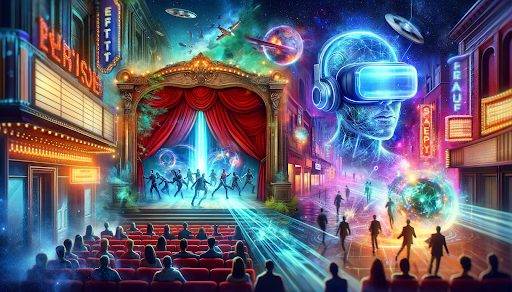The entertainment and media industry is witnessing unprecedented changes, driven by cutting-edge business and technological innovations. These advancements are not only transforming how content is created and consumed but are also opening new avenues for growth and engagement. For business enthusiasts, understanding these innovations is crucial as they offer valuable insights into the future of media and the opportunities it holds.

Streaming Services
Streaming services have revolutionized how audiences consume media, leading to the decline of traditional TV and cinema. Platforms like Netflix, Amazon Prime Video, and Disney+ have captured significant market share. In 2021, Netflix alone had over 214 million subscribers worldwide, showcasing the massive shift towards on-demand content consumption. The streaming market is expected to grow at a CAGR of 12.7% from 2021 to 2028, emphasizing its continued dominance.
Artificial Intelligence in Content Creation
Artificial Intelligence (AI) is playing an increasingly vital role in content creation and distribution. Companies like Netflix and YouTube use AI to analyze viewer preferences and suggest personalized content, significantly enhancing user engagement. Netflix’s recommendation algorithm is a prime example, responsible for driving 80% of the content watched on the platform. This level of personalization has proven to be a game-changer in the industry.
Virtual Reality (VR) and Augmented Reality (AR)
Virtual Reality (VR) and Augmented Reality (AR) are transforming the entertainment landscape by offering immersive experiences that traditional media cannot match. Disney, for example, has integrated VR and AR into its theme parks, creating interactive attractions that captivate visitors. These technologies are also being used in film and gaming to create more engaging and interactive experiences for users.
Blockchain Technology
Blockchain technology is making waves in the media industry by enhancing transparency and security in content distribution. It allows artists to directly manage and monetize their work, reducing dependency on intermediaries. Audius, a decentralized music streaming platform, uses blockchain to ensure artists receive fair compensation and maintain control over their content, representing a significant shift in how music is distributed and consumed.
Personalized Advertising
Personalized advertising has become a cornerstone of modern media, leveraging data analytics to deliver targeted ads to specific audiences. Companies like Google and Facebook lead in this space, using sophisticated algorithms to understand user behavior and preferences. Personalized ads are 80% more effective than generic ones, demonstrating their impact on consumer engagement and conversion rates.
Interactive Content and Gaming
The rise of interactive content and gaming has changed the entertainment industry, making it more engaging and participatory. Platforms like Twitch and YouTube Gaming have become immensely popular, allowing gamers to stream their gameplay live and interact with viewers in real-time. Epic Games’ Fortnite, with its interactive events and immersive gameplay, has set new standards for engagement, attracting millions of active players globally.
5G Technology
The advent of 5G technology promises to revolutionize media consumption by providing faster internet speeds and lower latency. This advancement enhances streaming quality, supports real-time interactions, and enables new forms of media experiences such as live VR streaming. The global adoption of 5G is expected to reach 1.7 billion subscribers by 2025, significantly impacting how media content is delivered and consumed.
Social Media Evolution
Social media platforms continue to evolve, introducing new features that enhance user interaction and content creation. TikTok, for example, has revolutionized short-form video content, amassing over 1 billion active users by 2021. Its algorithm-driven content recommendations and user-friendly interface have set new trends in social media engagement, influencing how content is shared and consumed globally.
Sustainable Media Production
As environmental concerns grow, the media industry is adopting sustainable production practices. Companies like the BBC are leading the charge, implementing eco-friendly measures in their production processes. The BBC’s sustainable production practices include using renewable energy, reducing waste, and promoting environmental awareness through their content, setting a benchmark for the industry.
Conclusion
The entertainment and media industry is at the forefront of a technological revolution, driven by innovations that are reshaping how we create and consume content. From streaming services and AI to VR, blockchain, and 5G, these advancements offer vast potential for growth and transformation. Staying informed about these trends is crucial for business enthusiasts to navigate the evolving landscape and capitalize on emerging opportunities.
HedgeThink.com is the fund industry’s leading news, research and analysis source for individual and institutional accredited investors and professionals








